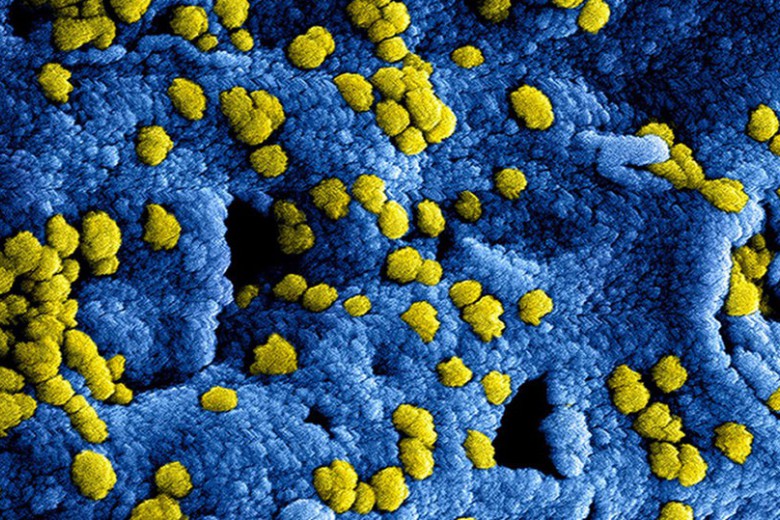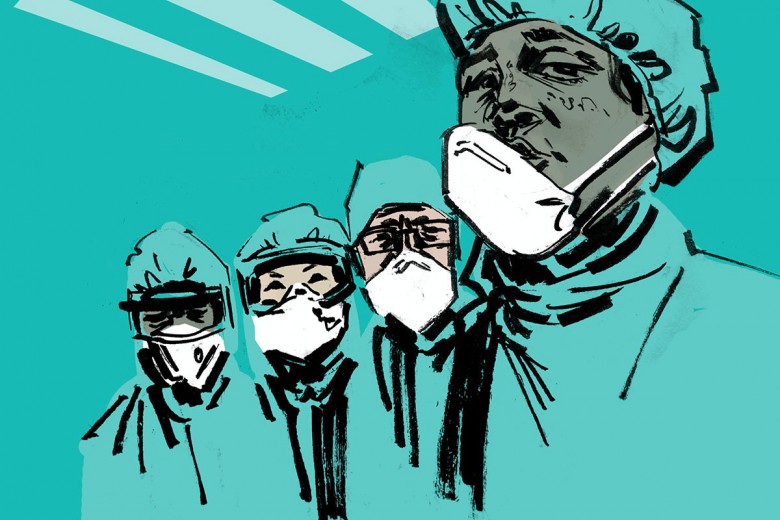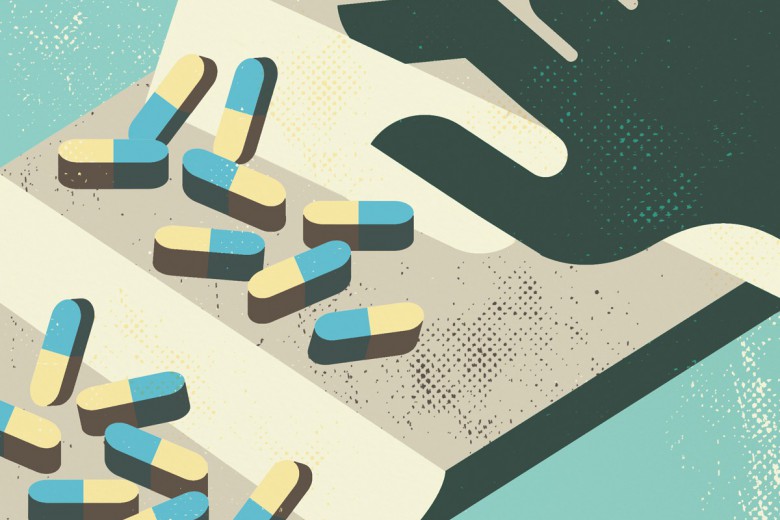Can health-care spaces and skills be used to build liberated societies? From China’s barefoot doctors to the Young Lords’ occupation of the Lincoln Hospital to the Black Panthers’ sickle cell anemia screening programs, many revolutionary organizations have used health care to build self-determination and people power, raise critical consciousness, and put into practice a microcosm of a just world.
Amid the twin crises of neoliberal capitalism and COVID-19, how do we practice health care in ways that are liberating? A year and a half ago, organizers and health-care workers met in Tkaronto for the first ever Liberation Health Convergence. Now, as the pandemic unfolds, the questions we aimed to answer together at the convergence have a new urgency. Many of us have returned to the analysis we built there to navigate the pandemic’s far-reaching health, social, and economic consequences. One thing is clear: the pandemic has only amplified the pre-existing crises of colonialism, capitalism, racism, and cisheteropatriarchy, and reinforced their role as the underlying drivers of societal and individual health.
Individual failings or systemic violence?
In institutional health care we are taught to examine the patient in front of us and detach their individual experience from the societal forces determining it. This approach leads us down a dangerous road of separating people’s health issues from the structural violence that produces and maintains inequities.
The ways in which we respond to overdose deaths is a good example. We talk about an “overdose crisis” rather than the crisis of criminalization, itself a byproduct of racial capitalism and colonialism. This enables us, as health workers, to absolve ourselves of the responsibility of addressing root causes that have contributed to the death of over 16,000 people across Canada in the past four years.
If drugs have negative health outcomes, it’s thanks to their cynical deployment by politicians looking for a way to subjugate, incarcerate, and/or deport Indigenous people, Black people, and other people of colour.
The epidemic of overdose deaths is one that is produced through xenophobia and racist immigration policies, anti-Indigenous racism, and anti-Black racism. Since the late 1700s, laws that prohibited Indigenous people from consuming alcohol have helped enforce racial superiority and control the land across Canada. Canada’s first official drug prohibition law – the Opium Act of 1908 – was created to appease those involved in anti-Chinese riots in Vancouver. In 1922, Emily Murphy, lauded as a pioneering Canadian feminist, wrote a book whose thesis argued that “aliens of colour” had formed a drug syndicate to “bring about the downfall of the white race” – which led to cannabis being outlawed in Canada the year after. In the U.S., Nixon reportedly invented the war on drugs as a political tool to incarcerate and disenfranchise Black people. If drugs have negative health outcomes, it’s thanks to their cynical deployment by politicians looking for a way to subjugate, incarcerate, and/or deport Indigenous people, Black people, and other people of colour (BIPOC).
There have been more overdose deaths in the first eight months of 2020 than in all of 2019 in B.C. Harm reductionists continue to raise the alarm about the compounded crises of COVID-19 and overdose deaths, and demand an end to the policing of people who use drugs. Instead of learning about this history of criminalization and how it determines health outcomes, health-care workers focus on pathologizing individuals’ relationships with drugs by labelling people with substance use “disorders” that need to be cured. At the same time, people who used drugs continue to experience blatant discrimination and neglect within the health-care system.
There are many other examples of the dangers of depoliticized health care. A patient disclosing an experience of gender-based violence in a clinic is seldom understood within the context of our patriarchal society, in which a womxn is killed every 2.5 days in Canada. And while Indigenous womxn and girls are the worst affected by patriarchal violence, the means of redress – police, courts, and the criminal justice system – create even more trauma for survivors. As discussed in reports including Red Women Rising, Addressing Gendered Violence against Inuit Women, and Reclaiming Power and Peace, not only have Black and Indigenous communities been traumatized by police harassment and brutality in their daily lives, but when individuals report gendered violence, they are met with racism, misogyny, and apathy from police and courts. Yet health-care workers focus on domestic violence screening forms and uncritically encourage womxn to report to the police – forcing them to depend on misogynistic and colonial institutions that are the very source of violence, oppression, and fear for many.
The same pattern becomes clear when we look at migrant health care. Often, migrant health care just means treating tropical or travel-related diseases. Other times, migrant health initiatives divide people into colonially-defined categories of “immigrant” and “refugee,” creating hierarchies between “good” and “bad” migrants. These categories serve to erase marginalized migrants including undocumented people, international students, and temporary foreign workers – people who may be uninsured or have difficulty accessing the health-care system. For example, in 2018 the UN ruled that Canada had violated the rights of Nell Toussaint, an undocumented migrant from Grenada who was repeatedly denied life-saving blood tests and medical procedures because she did not have a health card and could not afford to pay out-of-pocket.
Doctors are trained to act as agents of the state, screening out those they judge to be “taking advantage of the system,” instead of recognizing that it is the economic system that takes advantage of people by exploiting their labour and impoverishing them.
Despite the deeply-held belief of a benevolent universal health care system in Canada, many migrants continue to be denied necessary health care, and risk detention, deportation, crushing financial burden, and discrimination when accessing the health care system. At worst, health care workers actively participate in the dehumanization of undocumented migrants, threatening to disclose their immigration status to the Canadian Border Service Agency or the police out of an uncritical allegiance to the Canadian state and its racist immigration system. At best, migrant health care workers serve a vulnerable population out of benevolence, without understanding or addressing the root causes of forced migration: imperialist wars, resource extraction, trade laws that prioritize capital rights over human rights, and the active impoverishment of the world’s poorest regions through labour and economic exploitation that benefits the Global North.
Similarly, poverty and homelessness are often seen as individual failings rather than as a product of over 30 years of neoliberal capitalism and austerity, which have created grotesque levels of wealth inequality. As an example, doctors, who have considerable wealth and social privilege, have the power to decide who is and is not deserving of state benefits such as Ontario’s special diet allowance, which gives some low-income and disabled residents up to $250 if they can prove they need a special diet for an approved medical condition. In addition to this being a perverse incentive – one has to be “ill” in order to be able to afford to eat healthy – doctors are trained to act as agents of the state, screening out those they judge to be “taking advantage of the system,” instead of recognizing that it is the economic system that takes advantage of people by exploiting their labour and impoverishing them.
Finally, Indigenous health solutions are diminished to tokenistic acts of reconciliation and representation, rather than addressing ongoing colonialism. As an example, health-care workers are taught to call child protection services without considering how this continues the legacy of Indian residential schools and the 60’s scoop. Today, there are more Indigenous children in foster care than there were in residential schools at their peak. Family separation, a tool of subjugation used globally in colonial states and across borders, creates intergenerational trauma that is the very cause of health and social disparities that need to be addressed.
Without understanding the history of physical and cultural genocide against Indigenous people, there is no hope of disrupting such ongoing acts of colonization in health care.
Birth alerts – the practice of alerting authorities about a baby in need of protection prior to birth and without informing the parent – continue to occur across Canadian provinces, and are well-known to disproportionately affect Black and Indigenous families. Medical training and societal conditioning empowers health-care workers to judge and report families, but these judgements are rife with race and class prejudice – meaning health-care workers tend to report parents who are poor, are young, do not speak English well, or practice parenting styles of non-dominant cultures. Furthermore, the trope of the “bad Indigenous mother” was invented and used to justify forced sterilization against Indigenous women over the past 100 years until as recently as 2018.
Racism against Indigenous people is prevalent throughout the colonial health-care system, with many Indigenous people expecting to encounter racism when seeking health care. This was most recently apparent in the degrading comments made by health-care workers during Joyce Echaquan’s dying moments. Without understanding the history of physical and cultural genocide against Indigenous people, there is no hope of disrupting such ongoing acts of colonization in health care.
Non-reformist reforms
As Harsha Walia explained during the convergence, service provision “forces an individualization of collective societal issues.” The service provision model positions us to see ourselves as benevolent helpers of people in need – we’re trained to believe we know what people need better than they do. But at the convergence, we were reminded by a representative from Frontline Medics, a collective of street medics providing health support to communities in resistance, that “oppressed communities have the capacity to provide their own health care,” and they don’t necessarily need “experts” or the power dynamics they represent. In building parallel structures of health, these communities “lessen their dependence on the institutions that brutalize [them],” the Frontline Medics rep said.
Colonial health-care institutions disempower receivers of health care in so many ways. In a liberated society, the one-way provision of health care as a service will be gone. Everyone’s own expertise will be recognized and shared through exchanges of knowledge, skills, and/or care.
How do we take our skills out of hospitals and clinics and into communities so they can be of use in the collective liberation of oppressed communities?
The West has built most of its institutions on the backs of Black and Indigenous communities and other people of colour, and medicine is no exception. From inhumanely experimenting with drugs, surgeries, and nutrition on BIPOC bodies, to stealing knowledge about health from racialized and colonized peoples around the world, Western medicine has a violent history. In the context of ongoing colonial, racial, and heteropatriarchal violence, how do we as health-care workers rematriate health skills and knowledge into communities from which they were stolen? How do we take our skills out of hospitals and clinics and into communities so they can be of use in the collective liberation of oppressed communities? And the question that came up most often during the convergence was: how do we reconcile demands for incremental improvements within an unjust system with building alternatives outside the system?
To try and answer this question, we discussed the distinction between reformist reforms and non-reformist reforms, as first penned in Andre Gorz’s 1964 book Strategy for Labor . Reformist reforms involve appealing to a mainstream audience – one that’s believed to be progressive, objective, rational, and benevolent – typically by defanging radical demands. However, reformist reforms end up strengthening and legitimizing the oppressive institutions of our society – for example, by providing body cameras to police and electronic monitoring to border enforcement.
Non-reformist reforms slowly dismantle rather than entrench institutions grounded in historical and ongoing injustice.
In contrast, as Harsha Walia said during the convergence, non-reformist reforms are incremental steps taken to “increase people’s access to freedom” without undermining the freedom of others, and importantly, move us towards radical societal change. The latter approach requires we keep our eyes on the horizon of liberation – including police and prison abolition, a world without borders, land back, and an end to capitalism – visions toward which we can steer our shorter-term goals, campaigns, and acts of resistance.
From the street medic collectives organizing skill-shares and finding creative ways to support the health of communities involved in direct action against structural violence; to the people who use drugs organizing together in Moss Park to create and run the first unsanctioned supervised consumption site in Ontario; to the Young Lords stealing an X-ray van from their local public health unit so they could perform tuberculosis screenings in East Harlem; to the Black Panthers’ creation of free health clinics where people also engaged in political education – non-reformist reforms work to shift power and resources away from oppressive institutions and into the hands of community members. Non-reformist reforms slowly dismantle rather than entrench institutions grounded in historical and ongoing injustice.
Toward liberation
The COVID-19 pandemic has upended our usual points of reference. It has caused terrible suffering for many, but this time of transition also allows us to seriously consider transformation.
To practice health care toward a liberated society, we must question, challenge, subvert, and change the institutions in which we work. We must seek knowledge from outside colonial structures to learn about the social, environmental, political, and economic conditions that shape the health of people in Canada and elsewhere. And we must act in solidarity with oppressed communities and contemporary social movements, learning from them, and shifting our skills, knowledge, and power to them in support of community self-determination.
To achieve collective liberation, we must “be fearless in this work [toward justice], knowing that years or decades later, [we] will have been on the right side of history,” as Patrick Smith said at the convergence. This work is necessarily a collective struggle, and the movements we build are only as strong as the relationships in which they are based. As we confront the COVID-19 crisis, we find ourselves returning to the learnings we gained and relationships we built during the Liberation Health Convergence, connecting with radical health care workers to build communities of mutual support, resistance, and care.
The authors would like to thank Amanda Whitten, CJ Blennerhassett, and Baijayanta Mukhopadhyay for their insightful edits. The authors would also like to acknowledge all those who organized, contributed to, and participated in the Liberation Health Convergence.
The authors live in Toronto on lands that should remain under the jurisdiction of the Wendat, the Anishinaabek, Haudenosaunee, and the Mississaugas of the Credit nations.







